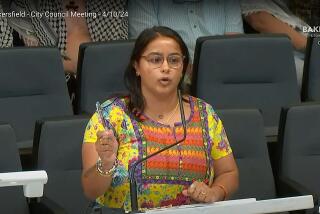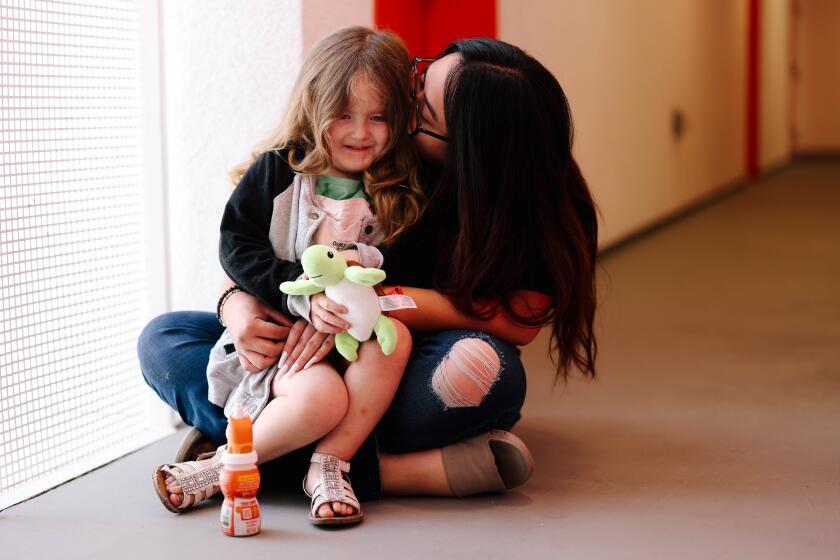Speakers urge Angelenos to aid Darfur
Conni Siminski had a tough time Sunday finding her way to First AME Church in South Los Angeles from her home in La Crescenta -- she got lost on the way -- but she wasn’t about to be deterred.
Siminski was on a mission: to learn more, at a program at the landmark church, about the ongoing genocide in the Darfur region of Sudan.
“The people in Darfur, they need us,” she said. “I just need to find out what can be done.”
Siminski was among hundreds who squeezed into First AME for Los Angeles Darfur Observance Day.
The observance, highlighted by a two-hour service aimed at inspiring a grass-roots movement to help end the genocide, was billed as a first-of-its-kind effort for a major U.S. city to draw attention to the crisis.
The genocide in the northeastern African nation, which has evoked memories of the Nazi Holocaust and other massive tragedies, has resonated deeply in Los Angeles’ Jewish community.
Sunday’s observance was developed after two Jewish organizations, the American Jewish Committee and Jewish World Watch, approached First AME and Mayor Antonio Villaraigosa to find ways to spur further activism.
Eventually, the effort was joined by a coalition of dozens of religious and human rights groups, including the Archdiocese of Los Angeles, the Islamic Center of Southern California and the UCLA African Studies Center.
The broad span of groups was evident among the multiracial crowd of 750 or more at the church.
They gave standing ovations to musical performances by the First AME Church Choir and to a group known as the Los Angeles Cantors. The program included speeches, photo displays and a video.
Susan Cole, an airline customer service worker from Culver City, said she was drawn to the program partly because of her African American and Jewish background.
“How many times do we have to relive the Holocaust, or how many times do we have to relive slavery?” she asked. “Hopefully, through observances and conversations like this, people can see their humanity.”
The enormous scale of the Darfur tragedy was the main focus of the event.
Darfur, an arid region the size of France in western Sudan, has been embroiled in major bloodshed since 2003.
The wave of killings, rapes and forced displacement has taken at least 200,000 lives and uprooted 2.5 million people from their homes.
The conflict is more complicated than sometimes recognized but, in broad terms, it is rooted in the resentment of non-Arab tribes over the feeling of being excluded from Sudan’s Arab-led central government. The dissidents formed rebel groups to attack government forces. But the government responded by arming Arab militias, known as janjaweed, who struck back by brutalizing civilians thought to belong to the same tribal groups as the rebels.
California officials have been among the leaders nationally in trying to apply economic pressure on Sudan to halt a crisis that President Bush has labeled genocide.
The state Legislature, the University of California Board of Regents and Los Angeles city and county leaders all have taken steps to avoid investing public employee pension funds or other money in companies with ties to the Sudanese government.
Still, speakers at Sunday’s program urged the audience to do more, including giving money to care for Darfur refugees and writing to Bush and members of Congress to call on the United Nations and African Union to deploy peacekeeping troops in the region.
In one of the event’s speeches, Rabbi Harold M. Schulweis, a co-founder of Jewish World Watch, said that in past genocides, the civilized world blamed ignorance, saying that people weren’t aware of the tragedies while they were occurring. But now, people “can no longer get away with the excuse, ‘We did not know.’ We know,” he said.
Siminski, for one, was inspired by the message, making a donation and filling out a “Save Darfur” postcard to send to the White House. “I’m motivated, I’m telling you,” she said. I got a [“Save Darfur”] sign for my yard. I’m going to talk to everybody I know.”
Organizers set up a website to provide more information, www.ladarfurobservance.org.
stuart.silverstein@latimes.com
More to Read
Start your day right
Sign up for Essential California for news, features and recommendations from the L.A. Times and beyond in your inbox six days a week.
You may occasionally receive promotional content from the Los Angeles Times.






